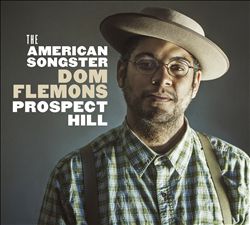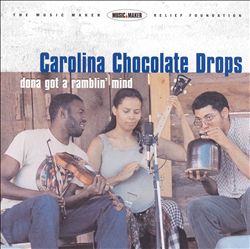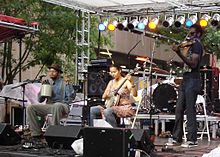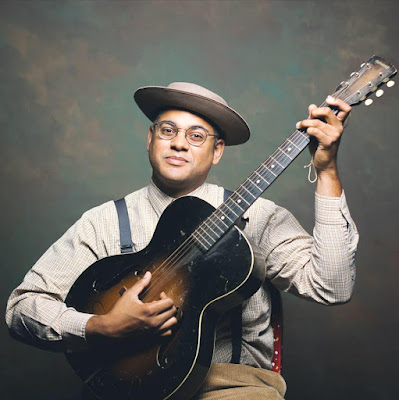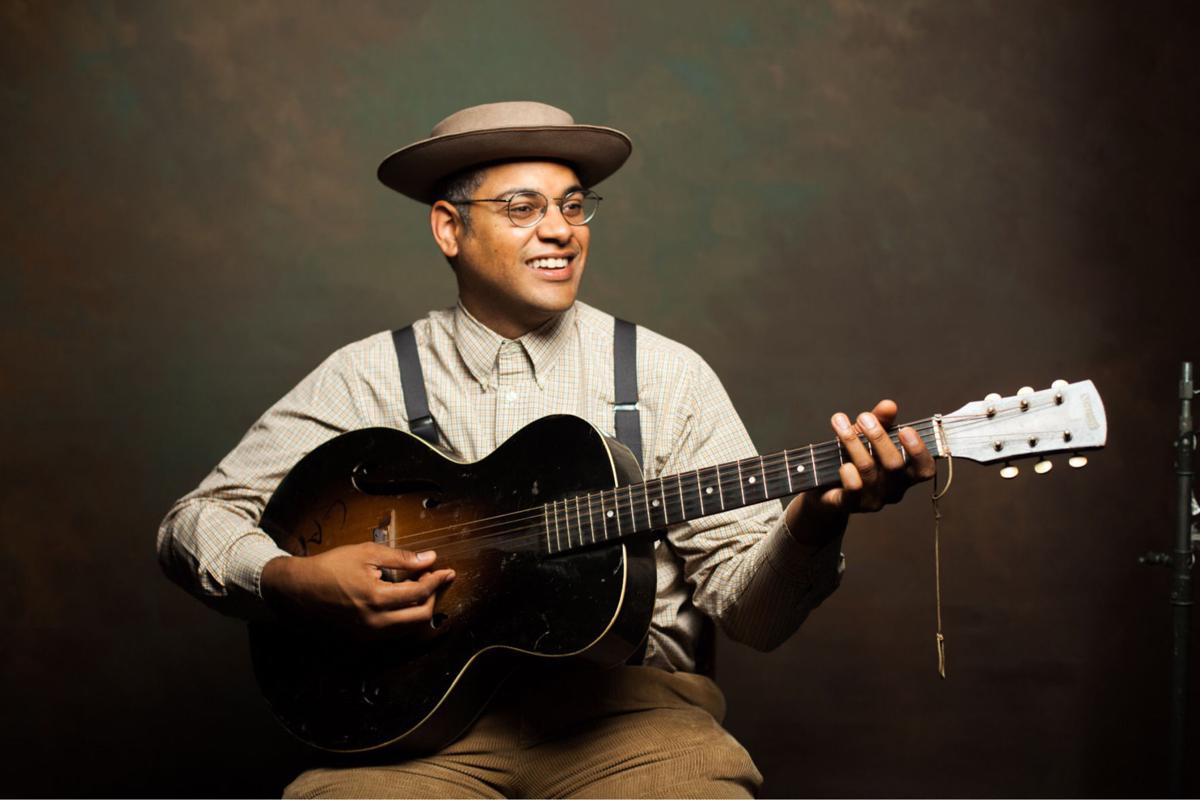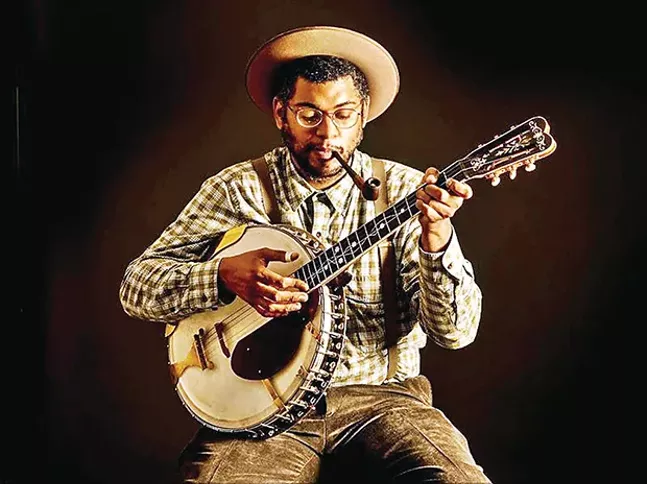
SOUND PROJECTIONS
AN ONLINE QUARTERLY MUSIC MAGAZINE
EDITOR: KOFI NATAMBU
SUMMER, 2021
VOLUME TEN NUMBER ONE
CHARLES MINGUSFeaturing the Musics and Aesthetic Visions of:
JEREMY PELT
(April 17-23)
WILLIAM GRANT STILL
(April 24-30)
AMINA CLAUDINE MYERS
(May 1-7)
KARRIEM RIGGINS
(May 8-14)
ETTA JONES
(May 15-21)
YUSEF LATEEF
(May 22-28)
CHRISTIAN SANDS
(May 29—June 4)
E. J. STRICKLAND
(June 5-11)
TAJ MAHAL
(June 12-18)
COLERIDGE-TAYLOR PERKINSON
(June 19-25)
DOM FLEMONS
(June 26-July 2)
CAMILLE THURMAN
(July 3-July 9)
https://www.allmusic.com/artist/dom-flemons-mn0000578398/biography
Dom Flemons
(b. August 30, 1982)
Artist Biography by Matt Collar
A rootsy singer/songwriter with a bent toward Americana, folk, banjo, blues, and jug band music, Dom Flemons first came to the public's attention in the late 2000s as a member of the Grammy-winning old-timey string ensemble the Carolina Chocolate Drops. He began his solo career while still a member of the group, carving out a reputation as the "American Songster" -- which was also the name of his 2008 solo album -- and developing a focus on historic American folk styles which often utilized arcane instrumentation like the bones, quills, and pan pipes. After leaving the Chocolate Drops in 2012, Flemons doubled down on his solo work, touring frequently and releasing well-researched albums like 2014's Prospect Hill and his 2018 exploration on African American pioneers of the American West, Black Cowboys.
A native of Phoenix, Arizona, Flemons grew up listening to his parents' vintage R&B collection. A gifted guitarist and harmonica player by his teens, he quickly expanded his musical boundaries, listening to artists like Bob Dylan, the Beatles, and Chuck Berry, as well as seeking out such early progenitors of American roots music as Woody Guthrie, Tom Paxton, and Jack Elliott. After high school, Flemons attended Northern Arizona University in Flagstaff, where he played locally, often busking on the street. It was while in Flagstaff that he came into contact with veteran percussionist, banjo player, and folklorist Sule Greg Wilson, a local musical oracle who had played with everyone from famed Nigerian percussionist Babatunde Olatunji to such legendary Piedmont blues artists as fiddler Joe Thompson and guitarist/vocalist Algia Mae Hinton. Wilson became a mentor to Flemons and helped him develop his playing and historical understanding of blues and folk music.
In 2005, at Wilson's behest, Flemons attended the Black Banjo Gathering, a four-day festival celebrating the African, Afro-Caribbean, and African-American origins of banjo music. During the gathering, Flemons befriended fellow roots music enthusiasts vocalist/banjo player Rhiannon Giddens and vocalist/violinist Justin Robinson. Inspired by their festival experiences, the trio formed the Carolina Chocolate Drops and released several highly acclaimed albums including 2006's Dona Got a Ramblin' Mind, 2010's Genuine Negro Jig, and 2012's Leaving Eden, among others. As a solo artist, Flemons continued to perform and record, debuting in 2007 with Dance Tunes Ballads & Blues. In addition to producing a number of other artists, he also released a collaborative album with guitarist Boo Hanks called Buffalo Junction. After amicably parting ways with the Carolina Chocolate Drops in 2012, Flemons refocused on his solo work, releasing the album Prospect Hill on Fat Possum in 2014. The next couple of years saw him building his reputation as popular touring act, landing prestigious gigs at Carnegie Hall as part of a Lead Belly tribute and at the opening ceremonies for the National Museum of African American History and Culture in Washington, D.C. In 2016, Flemons joined legendary British guitarist Martin Simpson on the album Selection of Ever Popular Favourites. His 2018 album, Black Cowboys, was released as part of Smithsonian Folkways' African-American Legacy Recordings series and unearthed material pertaining to African Americans' role as pioneers of the West. 2020 saw an expanded reissue of Flemons' Prospect Hill album that included the rare What Got Over EP and a selection of instrumentals.
https://www.thecountryblues.com/artist-reviews/dom-flemons/
Dom Flemons
If anyone believes that traditional, roots & blues music is on the wane in America, rejoice and meet Dom Flemons, the truehearted, freewheeling, multi-instrumentalist, folklorist, self-taught musicologist and modern day “American Songster.” As much a scholar as a performer, he came to prominence with the now famous ensemble of young troubadours, the Grammy award winning Carolina Chocolate Drops, of which he was a founding member along with Rhiannon Giddens and Justin Robinson. They won a GRAMMY for the 2011 album “Genuine Negro Jig” and were nominated for “Leaving Eden”, in 2012.
Now on a solo track, the renaissance-man’s recent successes have included a feature on the American National Public Radio (NPR), performing at the Newport Folk Festival; and, most importantly, making folk music relevant to young people in the 21St Century. He’s been out the gate as a professional only since 2005, still a relative rookie, with huge acclaim and a long musical career ahead of him.
Some blues purists have noted that he is really a “folkie” because he plays old time folk, jug band, black string band and mountain music, and black banjo music from Appalachia. Because he carries on the obscure black string band precursors to the blues and does not necessarily repeat the same old 12 bar blues songs, they don’t get him. Some folkies have conversely noted that he’s really a blueser, because he is reminiscent of the rural African American traditions that are often outside of the predominately white “Folk” traditions, not as in folk music, but as in the marketing term coined in the folk revival of the 1960s. His answer to that is “Let it stay in the vaults if you can’t improve upon it.”
He doesn’t care what anyone thinks. He will either lead you there or leave you behind. He will unabashedly delve into it all with gusto– blues, jug band, songster, jazz…with the boundless understanding that it all belongs and fits together. It’s all interconnected. He understands the universality of music without external boundaries, and more than almost anyone today, he traces back African American music clear back to the root of field hollers, Negro spirituals and jigs.
Therein lies the beauty! This is American music at its best. Flemons is a proud young musicianer of African American and Mexican heritage, who approaches traditions with great respect, but who has emancipated himself from all the externally imposed delineations and limitations. Flemons unapologetically ignores conventions and he has freed himself to go his own way musically, adventurously and confidently . “I want to experiment rather than to merely replicate. It can never be as good as the original, so I make the music fit my own style. I look at the old time music, the originals of black banjo music for the Carolinas, the fiddle and the sounds of folks like Syd Hemphill, Henry Thomas and Pegleg Howell. I let this music inform me. It matters today. I want to remember it, to be referential to the origins but be inventive. I respect it. This is music with energy, the same type of energy that rock and roll and punk has. People are willing to throw the old stuff away. If you play this music and you do anything but amazing things with it, the audience will call it “quaint”. I try to make good sounding music. That’s all.”
He’s made the world circuit, played at Bonnaroo and the Grand Ole Opry. He’s been all over Europe and he’s just getting started. By now, he’s one of the foremost advocates of traditional music, mostly in the black traditions. His blues draws from Popa Charlie Jackson and Hendrix, from Lightning Hopkins, Rev. Gary Davis, Josh White, Jim Jackson, Ma Rainey and Gus Gannon… but just saying that itself is irrelevant. This musician has absorbed everything he’s ever heard, internalized and processed it somewhere in his vast musical cranium. He is a walking embodiment of musicology delivered in song.
Flemons hails from Phoenix, Arizona. His musical journey included playing percussion in his high school band. Like many musicians, he picked up the guitar and harmonica as a teenager, and played locally in coffee houses; and, he became a regular performer on the Arizona music scene as songwriter, performer, producer and slam poet. This aspect of the artist is an essential aspect of his musical being. He’s not only a deep musicologist, but a powerful lyricist and an extremely intelligent, articulate and eloquent orator. An English major at Northern Arizona University, he performed in two national poetry slams in 2002 and 2003. (See this reference to learn more about this vibrant poetry form
http://www.poets.org/poetsorg/text/brief-guide-slam-poetry.
Flemons, stylish in his retro-chic garb, also understood that the 1960s era folk-revival musicians like Phil Ochs, Dave Van Ronk, Bob Dylan and Mike Seeger carried on the old traditions and he learned all he could from them. He also internalized all of the blues greats, such as Mississippi John Hurt, Howlin’ Wolf, Alvin Youngblood Hart, along with the country based roots and rockabilly players like Hank Williams, Chuck Berry and Carl Perkins.
Flemons’ foremost instrument is the banjo, an instrument of African American heritage that takes its roots back to West Africa. As one of the true heirs of the African American banjoists, he plays multiple styles including his own devised from having studied the origins of the banjo clear back to slavery days. He is an expert at North Carolina black banjo traditions, clawhammer, tenor and three-finger styles of playing. Mike Seeger, one of the greatest musicologists of the banjo, had a profound influence on him. “Mike Seeger knew and understood the early black string band music and the wide range of banjo styles. He helped me merge traditional music while maintaining my own integrity.” Flemons plays a Deering 4 string banjo, a Gibson GB-1 6-string and a very rare and special, huge 1920s era Clef Club banjo.
Dom Flemons just released his third recording with the Music Maker Relief Foundation, Prospect Hill. Check it out.
The bard confidently told the countryblues.com “I am an impressionist”, and no writer could find a better descriptive of the young renaissance man. Flemons is passionate, witty and musically playful. This guy has a burning desire to take traditional music into the future, with limitless creative and a strong-willed intellectual point of view. This combination makes him one of the most important and powerful young artists in America today. Keep your eyes and ears on the young genius.
https://en.wikipedia.org/wiki/Dom_Flemons
Dom Flemons
Dominique Flemons (born August 30, 1982) is an American old-time music, Piedmont blues, and neotraditional country multi-instrumentalist, singer, and songwriter. He is a proficient player of the banjo, fife, guitar, harmonica, percussion, quills, and rhythm bones.[1] He is known as "The American Songster" as his repertoire of music spans nearly a century of American folklore, ballads, and tunes.[2] He has performed with Mike Seeger, Joe Thompson, Martin Simpson, Boo Hanks, Taj Mahal, Old Crow Medicine Show, Guy Davis, and The Reverend Peyton's Big Damn Band.[1]
A member of the Carolina Chocolate Drops from their inception in 2005 until 2013, Flemons has released five albums in his own name, although two of those were collaborations with other musicians. Flemons appreciates the tradition inherent in his solo work and once stated, "I want to experiment rather than to merely replicate. It can never be as good as the original, so I make the music fit my own style. I look at the old time music, the originals of black banjo music for the Carolinas, the fiddle and the sounds of folks like Sid Hemphill, Henry Thomas and Peg Leg Howell."[3]
His latest album, Black Cowboys (2018), was nominated for a Grammy Award for Best Folk Album at the 61st Annual Grammy Awards,[4] and for a Blues Music Award at the 40th Blues Music Award ceremony in the 'Acoustic Album' category.[5]
Biography
Early life
Flemons was born in Phoenix, Arizona, United States.[6] He is of African American and Mexican heritage. He played percussion in his high school band, and whilst a teenager played guitar and harmonica in local coffee houses.[3] He grew up listening to his parents record collection, and expanded his knowledge by studying recordings by Bob Dylan, the Beatles, and Chuck Berry. This led him to the pioneers of American folk music, including Woody Guthrie, Tom Paxton, and Ramblin' Jack Elliott.[7] Flemons became a frequent busker and performer on the Arizona music scene. He obtained a major in English at Northern Arizona University, in Flagstaff, Arizona, and partook in two national poetry slams in 2002 and 2003.[3] In Flagstaff, Flemons met Sule Greg Wilson, a local percussionist, banjo player, and folklorist. Wilson became a mentor to Flemons assisting his playing techniques and understanding of the history of the blues and American folk music.[7]
Carolina Chocolate Drops
The Carolina Chocolate Drops is an old-time string band from Durham, North Carolina. Their 2010 album, Genuine Negro Jig, won the Grammy Award for Best Traditional Folk Album at the 53rd Annual Grammy Awards.[8]
Formed in November 2005, following the members' attendance at the first Black Banjo Gathering, held in Boone, North Carolina, in April 2005, the group grew out of the success of Sankofa Strings, an ensemble that featured Dom Flemons on bones, jug, guitar, and four-string banjo, Rhiannon Giddens on banjo and fiddle and Súle Greg Wilson on bodhrán, brushes, washboard, bones, tambourine, banjo, banjolin, and ukulele, with Justin Robinson as an occasional guest artist.
The Carolina Chocolate Drops released five albums including 2012's Leaving Eden, and one EP, whilst Flemons was a member, and opened for Taj Mahal and, in 2011, Bob Dylan.[9] They performed on Mountain Stage,[10] MerleFest, and at the Mount Airy Fiddlers Convention. Additionally they have performed on A Prairie Home Companion, Fresh Air, and BBC Radio in early 2010, and at the 2010 Bonnaroo Music Festival in Manchester, Tennessee,[11] and at the 2011 Romp,[12] in Owensboro, Kentucky. On January 17, 2012 they appeared live on BBC Radio 3.[13] They performed on the Grand Ole Opry several times. They also appeared on the UK's BBC Television program, Later... with Jools Holland.[14]
On November 12, 2013, the Chocolate Drops announced that Flemons would be leaving to continue his own solo career.[15]
Solo career
Flemons solo career began while he was still a member of the Carolina Chocolate Drops. He self-released his debut solo album in 2007, Dance Tunes Ballads & Blues.[7] His next album was issued the following year. American Songster was Flemons first release on Music Maker.[6] He was then featured on NPR performing at the Newport Folk Festival.[3] Over the past decade Flemons has performed as a soloist at venues such as, Carnegie Hall as part of a Lead Belly tribute; Cecil Sharp House; the Grand Ole Opry; at the opening ceremonies for the National Museum of African American History and Culture; at the National Cowboy Poetry Gathering; and represented the United States at the 2017 Rainforest World Music Festival in Kuching, Malaysia.[16]
In 2014, Prospect Hill saw Flemons enlist other musicians on his recording. These included Ron Brendle (bass), Guy Davis (banjo, harmonica, percussion and backing vocals), Keith Ganz (banjo and guitar), Brian Horton (clarinet, saxophone), Ben Hunter (drums, fiddle, backing vocals), Pura Fé (backing vocals), Joe Seamons (backing vocals) and Kobie Watkins (drums).[17] The album saw releases on both the Fat Possum and Music Maker labels.[18] The album received national press coverage.[6] Prospect Hill contained seven of Flemon's own penned tracks out of a total of fourteen on the collection.[19] Flemons was then a member of Music Maker Relief Foundation's Next Generation Artists program, and served on Music Maker's board of directors. He continues to discover young talent for the Foundation to assist and has promoted, recorded, and performed with more mature Music Maker artists including John Dee Holeman, Boo Hanks, Captain Luke, and Macavine Hayes.[6]
His next album required Flemons to undertake some research work, and thus become a scholar, old record collector and part historian.[1] The project entailed depicting the story of African Americans who helped to shape the American West, and the tunes they were familiar with.[20] They included "Home on the Range", which the field recorder and musicologist John Lomax recorded from a black cook in San Antonio. Equally "Goodbye Old Paint" was first recorded by Lomax as performed by a white fiddler, but Flemons discovered that "... another musician talked about how he learned the song from an ex-slave who worked for his father on the ranch." That has been credited as the black cowboy and former slave, Charley Willis. Thus the songs and poems that were used in the ensuing album depicted a century old story, following the footsteps of thousands of African American pioneers.[21] The individuals unearthed included Nat Love and Bass Reeves, the latter being the first black Deputy US Marshal west of the Mississippi, who some believe was the model for the Lone Ranger. Flemons duly wrote a song about the leading black movie cowboy of his time, Bill Pickett, and used other stories including cowboys who became Pullman porters and, in turn, became important figures in the civil rights movement. Black Cowboys (2018) was issued as part of the African American Legacy Recordings series issued in conjunction with the Smithsonian Institution's National Museum of African American History and Culture. Flemons played old musical instruments such as the six-string banjo and the quills, as was originally used by Henry Thomas.[20]
In 2017, Flemons was featured on David Holt's State of Music on PBS. He also performed as the bluesman Joe Hill Louis on CMT's television program Sun Records. Flemons launched a podcast, American Songster Radio, on WUNC National Public Radio and issued a couple of instructional DVD's via Stefan Grossman’s Guitar Workshop.[22]
Collaborations
In 2012, Flemons collaborated to record an album with the Piedmont blues guitarist and singer Boo Hanks, entitled Buffalo Junction.[7] Four years later, Flemons played alongside with the British guitarist Martin Simpson, to jointly record the album, A Selection of Ever Popular Favourites.[7] It was released on Fledg'ling Records.[23]
Musical instruments
Flemons' foremost instrument is the banjo, with Mike Seeger having had an influence on Flemons playing style. Flemons plays a Deering 4-string banjo, a Gibson GB-1 6-string and a rare, oversized 1920s era Clef Club banjo.[3]
Recent times
As at 2019, Flemons lived in the Washington, D.C. area.[2]
Accolades and awards
The Boston Globe commented that "most folk artists go by "singer-songwriter" or simply "musician." But "American songster" speaks to a greater truth about the work Flemons, a multi-instrumentalist, has accomplished as a founding member of the Carolina Chocolate Drops and now..., as a solo artist."[24]
Flemons won a Grammy Award as part of the Carolina Chocolate Drops for their album, Genuine Negro Jig. His latest solo album, Black Cowboys (2018), was nominated for a Grammy Award for Best Folk Album and for a 2019 Blues Music Award in the 'Acoustic Album' category.
Discography
Albums
| Year | Title | Collaboration | Record label |
|---|---|---|---|
| 2007 | Dance Tunes Ballads & Blues | CD Baby | |
| 2008 | American Songster | Music Maker | |
| 2012 | Buffalo Juncton | with Boo Hanks | Music Maker |
| 2014 | Prospect Hill | Fat Possum Records / Music Maker | |
| 2016 | A Selection of Ever Popular Favourites | with Martin Simpson | Fledg'ling Records |
| 2018 | Black Cowboys | Smithsonian Folkways |
Singles
Year A-side B-side Record label
2019 "Long Journey Home" & "There's A Brown Skinned Girl Down The Road" "Po' Black Sheep" Need to Know
[25]
Selected other recordings
- 2008: Heritage : Carolina Chocolate Drops :4-String Banjo, Clappers, Drums (Snare), Jug, Percussion, Vocals
- 2009: Carolina Chocolate Drops & Joe Thompson :Carolina Chocolate Drops / Joe Thompson :Vocals, Guitar, Jug
- 2009: All the Pretty Horses : The Elftones / Rhiannon Giddens :Banjo, Harmonica
- 2009: Drunken Barrel House Blues : Eden and John's East River String Band :Guest Artist, Dancer, Guitar, Harmonica, Jug, Quills, Vocals
- 2010: Genuine Negro Jig : Carolina Chocolate Drops :4-String Banjo, arranger, composer, Drums (Bass), Foot Percussion, Guitar, Jug, Throat Singing, Vocals
- 2010: Carolina Chocolate Drops/Luminescent Orchestrii (EP) : Carolina Chocolate Drops / Luminescent Orchestrii :4-String Banjo, composer, Handclapping, lyricist, Vocals
- 2011: Be Kind to a Man When He's Down : Eden and John's East River String Band :Guest Artist
- 2012: Voice of Ages : The Chieftains :Arranger, Quills
- 2012: Leaving Eden : Carolina Chocolate Drops :4-String Banjo, arranger, composer, Drums (Bass), Drums (Snare), Guitar, Jug, Quills, Vocals
- 2013: Celebrates 50 Years of Music : Tom Rush :Banjo, composer, Guitar (Acoustic), Harmonica, Pan Pipes, Vocal Harmony, Vocals
- 2014: Haven't Got the Blues (Yet) : Loudon Wainwright III :Harmonica, Jug
- 2015: American Originals : Cincinnati Pops Orchestra / John Morris Russell :Banjo, Harmonia, Percussion, Vocals[26]
External links
- Flemons discography at Discogs.com
- Dom Flemons Papers, Southern Folklife Collection, University of North Carolina at Chapel Hill
https://www.azcentral.com/story/entertainment/music/2021/06/22/arizona-musician-dom-flemons-american-songster/7771618002/
How 'Black Cowboys' helped Grammy-winning songster Dom Flemons reclaim his Arizona roots
June 22, 2021
Arizona Republic
Dom Flemons' fascination with tracing the roots of American music through the early days of rock 'n roll to the folk traditions that continue to inform so much of what he does is part of how he came to buy his first guitar at Ziggie's Music as a Phoenix teen.
"I'd heard the story that Duane Eddy had gotten his guitar he used on 'Rebel Rouser' at Ziggie's as well, way back," he said. "And I was always kind of an early rock and roll kid. Until I got into folk music."
Getting deeper still into folk music is what eventually led him to leave Arizona for North Carolina, where he formed an old-time string band called the Carolina Chocolate Drops.
Their "Genuine Negro Jig" won a Grammy for Best Traditional Folk Album in 2011.
Two years later, Flemons left the Chocolate Drops to focus on the solo music he'd been doing all along and earned another Grammy nomination six years later for "Black Cowboys."
Flemons will perform in his hometown at 7 p.m., Saturday, June 26, at the Musical Instrument Museum's Music Theater.
The Story behind Flemons' 'Black Cowboys'
"I wanted to bring back all the different musical influences that I had picked up along the way, in my travels, while in some ways reclaiming my roots in Arizona," Flemons said. "So I put together an album called 'Black Cowboys' for Smithsonian Folkways. I had started to read about the history of Black cowboys, and it started this idea in motion."
Flemons had some first-hand knowledge of Black cowboys, having spent a large part of his life in Arizona.
"With my father being from Flagstaff, there was always a sense of rural African-American culture and the cowboys and working people that had migrated from other places," Flemons said.
"But I didn't necessarily think of Black cowboys as a prominent feature of the settlement of the West in the way that I would find when I was first exposed to the idea at Painted Desert National Park. One year, I was traveling back out west to visit my family. And I found a book called 'The Negro Cowboys.'"
A dad and daughter as bandmates:How the Exbats came to be
The Black cowboy tradition in the West
That's where Flemons learned that one in four cowboys that settled the West and were part of those early cattle trails were African American.
"So the book sort of opened up this idea of Black cowboys and sort of the first interactions of African people on the North American continent," said Flemons.
In the process of putting the album together, he ended up reading the autobiography of a Black cowboy named Nat Love, who spent part of his cowboy years in Holbrook, Arizona, which has a particular connection to his family.
https://washingtoncitypaper.com/article/324718/dom-flemons-profile/
Dom Flemons Is Rewriting the American Songbook

